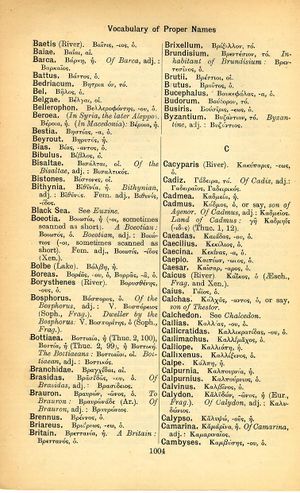Boeotia: Difference between revisions
ἀλλ' οὐκ ἂν μαχέσαιτο· χέσαιτο γάρ, εἰ μαχέσαιτο → fighting is what she can't do, for if she should fight she would shit
m (Text replacement - "link={{" to "link={{") |
m (Text replacement - "}}]]" to "}}]]") |
||
| Line 1: | Line 1: | ||
{{WoodhouseENELnames | {{WoodhouseENELnames | ||
|Text=[[File:woodhouse_1004.jpg|thumb | |Text=[[File:woodhouse_1004.jpg|thumb | ||
|link={{filepath:woodhouse_1004.jpg | |link={{filepath:woodhouse_1004.jpg}}]]Βοιωτία, ἡ (-οι, sometimes scanned as short). | ||
<b class="b2">A Boeotian</b>: [[Βοιωτός]], ὁ. | <b class="b2">A Boeotian</b>: [[Βοιωτός]], ὁ. | ||
Revision as of 10:11, 15 August 2017
English > Greek (Woodhouse)
Βοιωτία, ἡ (-οι, sometimes scanned as short).
A Boeotian: Βοιωτός, ὁ.
Boeotian, adj.: Βοιώτιος (-οι, sometimes scanned as short). Fem. adj., Βοιωτίς, -ίδος (Xen.).
Latin > English (Lewis & Short)
Boeōtĭa: ae, f., = Βοιωτἰα.
I Bœotia, a district of Greece proper, whose capital was Thebes, the birthplace of Bacchus and Hercules, Plin. 4, 7, 12, § 25; Cic. N. D. 3, 19, 49; Ov. M. 2, 239; Mel. 2, 3, 4; acc. to fable, so called either after Apollo's cow (Βοῦς), Ov. M. 3, 13, or from Bœotus, the son of Neptune, Hyg. Fab. 186.—Its inhabitants were noted for their stupidity, Cic. Fat. 4; Nep. Alcib. 11, 3; id. Epam. 5, 2; Hor. Ep. 2, 1, 244; Liv. 42, 43 sqq.; Tert. Anim. c. 20; cf. the Comm. upon Aelian. Var. H. 13, 25; Schol. Apoll. Rhod. Argon. 3, 1241.—
B Derivv.
1 Boeōtĭus, a, um, adj., = Βοιώτιος, Bœotian: Bacis, Cic. Div. 1, 18, 34: vates, id. ib. 2, 26, 56: Neo, Liv. 44, 43, 6: Haemon, Prop. 2, 8, 21: moenia = Thebae, Ov. M. 3, 13: Thyas, Val. Fl. 5, 80.—In plur.: Boeōtii, ōrum, m., the Bœotians, Nep. Alcib. 11, 3; Liv. 33, 1, 1; Plin. 10, 21, 24, § 49.—
2 Boeōtus, a, um, adj., = Βοιωτός, Bœotian (poet.): tellus = Boeotia, Ov. M. 12, 9: flumina, Stat. Th. 7, 424: urbes, id. ib. 4, 360: duces, Luc. 3, 174: Orion, Ov. F. 5, 493.—In plur.: Boeōti, ōrum, m., the Bœotians, Liv. 33, 29, 1 sq.; 42, 43, 5 sq. al.: Boeotūm = Boeotorum, Hor. Ep. 2, 1, 244; Avien. Orb. Terr. 586; Prisc. Perieg. 428.—
3 Boeōtĭcus, a, um, adj., = Βοιωτικός, Bœotian: frumentum, Plin. 18, 7, 12, § 66: cucumis, id. 19, 5, 23, § 68: napus, id. 19, 5, 25, § 76.—
4 Boeōtis, ĭdis, f., = Βοιωτίς = Bœotia, Mel. 2, 3, 4.—
II The wife of Hyas, and mother of the Pleiades, Hyg. Astr. 2, 21.—
III The Bœotian woman, the name of a lost comedy of Plautus, Gell. 3, 3, 3.
Latin > French (Gaffiot 2016)
(1) Bœōtĭa,¹² æ, f. Béotie [province de la Grèce] : Cic. Nat. 3, 49 || épouse d’Hyas, mère des Pléiades : Hyg. Astr. 2, 21 || -tĭcus, ou -tĭus, ou -tus, a, um, de Béotie, Béotien : Liv. 42, 44, 6 ; Cic. Div. 1, 74 ; Stat. Th. 4, 360 || -tī, ōrum, m., Varro ; Nep. Epam. 8, 3 ; Liv., ou -tĭī, Cic. Pis. 86 ; 96, Béotiens.
(2) Bœōtĭa, æ, f., mère des Pléiades : Hyg. Astr. 2, 21.

